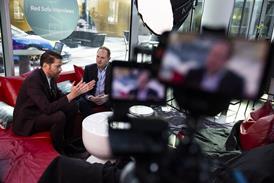All features articles – Page 9
-
 Feature
FeatureClean energy around the coast
Infrastructure developments at the UK vehicle handling ports through 2021 were tied closely to sustainability initiatives
-
 Feature
FeatureDelivering emissions cuts in the face of disruption
Logistics providers including DSV, Inform, Kuehne+Nagel and Maersk are making sustainability a side-effect of supply chain optimisation
-
 Feature
FeatureA sea change for sustainable vehicle delivery
Short-sea vehicle carriers, including Höegh Autoliners and UECC, are investing in cleaner vessel technology to meet ambitious goals and make shipping more sustainable
-
 Feature
FeatureA carbon-neutral network for Volvo
Volvo Cars is making good on its commitments at COP26 to cut carbon from its supply chain operations as well as the vehicles it is making, including through an internal pricing mechanism
-
 Feature
FeatureCATL powers ahead with a regional, sustainable supply chain strategy
With a new carbon-neutral gigafactory in China, and a plant set to start production this year in Germany, the Chinese battery cell producer is scaling its production and logistics to create secure and sustainable battery supply.
-
 Feature
FeatureNo more rough estimates
Toyota’s Project ETA is designed to trace the movement of finished vehicles in North America. Kevin Austin leads the project and explains how it will work
-
 Feature
FeatureAL FVL Spring 2022 Digital Edition - Sailing towards a more sustainable supply chain
The spring digital edition of Automotive Logistics and Finished Vehicle Logistics magazine is out now. It features interviews with Toyota and Volvo, as well as an overview of activity at the European vehicle handling ports
-
 News
NewsCarrypicker startup bets on artificial intelligence
An artificial intelligence system from the Hamburg-based startup Carrypicker is creating climate-friendlier logistics with smart scheduling of partial loads and routes. No dispatcher could ever match its performance.
-
 News
NewsLocal battery production promises to re-industrialise Europe
Localising lithium-ion battery production in Europe through greater vertical integration does not just promise a more secure battery supply chain. It could play a major role in the industrial salvation of a market that has lost its competitive footing against stronger Asian rivals in the race to a more sustainable future of mobility. What is needed to make good on that promise is strong collaboration amongst the companies involved in securing the future of electric vehicle production.
-
 Feature
Feature[Whitepaper] Tracking every part – How RFID enables better automotive supply chain visibility
Download this whitepaper to learn how using RFID technology for automated parts identification can help automotive manufacturers mitigate supply chain disruption, reduce inventory, better manage variety and ultimately increase profits.
-
 Feature
FeatureAn ongoing crisis for terminal throughput
Supply chain delays that were initially viewed as temporary hiccups have now morphed into a prolonged crisis as global trade dynamics have been upended
-
 Feature
FeatureA shift in priorities for the supply chain
Ongoing disruption in the automotive supply chain has triggered a focus on supply chain visibility and robustness as the means to secure healthy global networks
-
 Feature
FeatureA visible improvement at Nissan
Nissan North America is putting in place more strategic supply chain processes backed up by the latest technology to provide better visibility and predictive analysis in the delivery of its vehicles
-
 Feature
FeatureAL FVL Winter 2021 digital edition – Vision80: a new line of sight for Lotus Cars
The winter edition of Automotive and Finished Vehicle Logistics magazine is out now, featuring an in-depth focus on the fast-paced transformation at Lotus Cars. Michael Dickinson, executive director of supply at the high-end sportscar maker, explains how integrating supply chain functions and scaling operations will put Lotus on the map. ...
-
 Feature
FeatureStart-up pace, high-end experience at Lotus
Lotus Cars is charging ahead on its transformation into a globally recognised sportscar maker. Michael Dickinson, executive director of supply, explains how integrating supply chain functions and scaling operations will put the company on the map
-
 Feature
FeatureA more reliable rail network for North America
At this year’s Finished Vehicle Logistics North America conference KCS president and CEO, Patrick Ottensmeyer talked in detail about his company’s merger with Canadian Pacific
-
 Feature
FeatureE-book: Productivity gains in real time – Unlocking ROI in vehicle logistics tracking solutions
Download this free e-book to learn how the return-on-investment for next generation real time location services has changed for finished vehicles in the post-cloud, post-AI technology landscape, with significant cost, operational and time advantages for OEMs compared to legacy systems. In partnership with Cognosos.
-
 Feature
FeatureLocalising the balance of power at GM
GM is putting its money where its mouth is when it comes to stated goals for electric and autonomous vehicle production in North America. Closer integration with its battery suppliers is key to success, as is its strategic alliance with Honda, writes Marcus Williams
-
 Feature
FeatureAL FVL Autumn 2021 digital edition – Moving forward together through disruption
The autumn digital edition of Automotive Logistics and Finished Vehicle Logistics magazine is out now, featuring a four-part, in-depth special on Renault Group, in which its top executive for supply chain and logistics, Jean-François Salles, explains the supply chain revolution underway at the carmaker
-
 Feature
FeatureSustainable supply chains make for sustainable business models
Renault carbon reduction targets will be a challenge for logistics, but the carmaker is working on projects for alternative fuels, transport innovations and new partnerships in the circular economy.

























![Global[1]](https://d3n5uof8vony13.cloudfront.net/Pictures/web/a/d/s/global1_726550.svgz)




